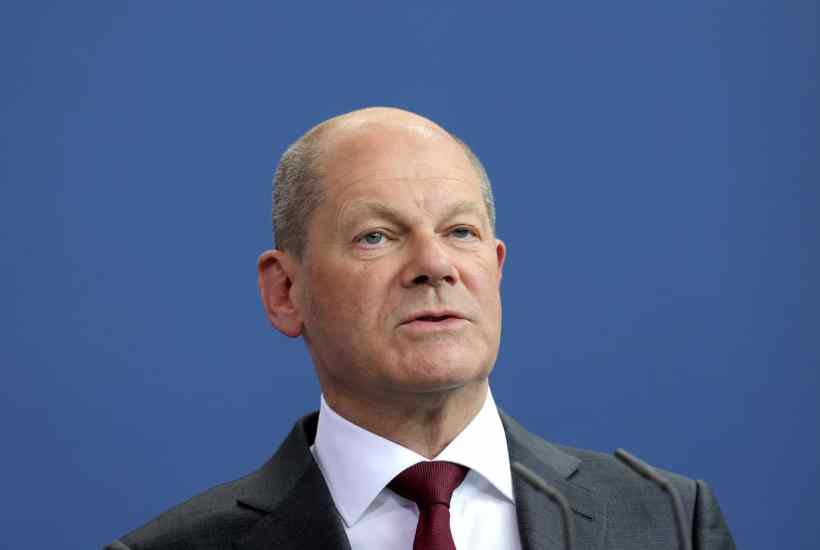‘A giant step for German and European security,’ is how Chancellor Olaf Scholz described his government’s €100 billion cash injection for the country’s depleted military. But while Germany’s newfound commitment to its own defence is welcome, its commitment to Ukraine’s is still questionable at best.
Over the weekend, the German newspaper Die Welt reported that it had seen documents showing that Berlin had reduced military support for Ukraine to ‘a minimum’. According to inside sources, only two German weapon deliveries have reached Ukraine since the end of March. Both contained light equipment such as mines, hand grenades and spare parts for machine guns. The last delivery of anti-tank and anti-aircraft weaponry dates back to 25 March.
This reality is strangely at odds with Scholz’s combative rhetoric. Last week, at the World Economic Forum in Davos, the Chancellor condemned Putin’s ‘imperialism’. He said that the invasion had led to a fundamental change in German foreign policy: ‘For the first time ever, Germany is delivering weapons into such a war zone, including heavy gear.’ He added: ‘Putin will only seriously engage in peace negotiations when he realises that he cannot break Ukraine’s defences.’
So why has Germany been so poor at shoring up those Ukrainian defences? The reluctance to support Kyiv in part persists out of a misguided sense of historical legacy. As the historian Timothy Snyder argued: ‘the confusion of responsibility and guilt has become a Russian weapon’. Had it been determined to do so Germany could have delivered more weapons earlier, even if it might have taken longer than its better-funded American and British allies.
Others have argued that Berlin has now overcome its reluctance and wants to deliver but can’t because of its depleted military supplies. Look to the deal struck with Poland, these people argue. Prime Minister Mateusz Morawiecki confirmed that his country had sent over 240 Soviet-era T-72 tanks to Ukraine and hoped that western allies might help replenish Poland’s stock. Germany was asked to send a set of Leopard 2 tanks to its neighbour.
The Polish President Andrzej Duda claimed last week Germany had agreed to send the tanks but then broke its promise. Berlin responded with surprise and indignation at the accusations. Spokesman Steffen Hebestreit said the German government was ‘baffled’ by the allegations and said no promise had been made, adding that the Bundeswehr currently only has 50 of these modern tanks. Hebestreit promised that more Leopard 2 tanks were in the pipeline but that he was in no position to say when they might be deliverable.
Ineffective communication in Berlin is becoming a real problem. If the country is indeed struggling to deliver weapons – as may well be the case after years of underfunding its armed forces – then the promises to Ukraine need to be realistic rather than idealistic. Scholz is oscillating between overpromising support for Ukraine one day and issuing vague excuses the next. Questioned last week about the delays, he replied, ‘I am not Kaiser Wilhelm,’ implying that German foot-dragging might be deliberate. Perhaps Scholz is wary of sleepwalking into another major European war – but the historical reference seems strained when he has already promised so much.
The Chancellor has not helped the situation by continuing to seek the role of honest broker. Together with the French President Emmanuel Macron, Scholz spoke to Putin on the phone for 80 minutes at the weekend, asking the Russian President to enter ‘direct, serious negotiations’ with Volodymyr Zelensky. That attempt to play peace broker must seem hollow to Ukrainians all the while Scholz refuses to visit Kyiv, despite Zelensky’s repeated requests for this powerful political statement.
The Ukrainians seem desperate to hold France and Germany to their commitments. Who can blame them? The 2014 Minsk agreement, which saw Paris and Berlin broker an attempted buffer zone between Ukraine and the breakaway eastern regions, failed to halt Russian aggression. The illegal annexation of Crimea too went unpunished. Germany continued to extend trade links to Moscow, most damagingly in the form of the Nord Stream 2 gas pipeline which excludes Ukraine from the network. How much this is still on Ukrainian minds became obvious when President Frank-Walter Steinmeier, then foreign minister, was disinvited from a visit in Kyiv earlier this year. While Zelensky has since moved to resolve this ill-will, inviting both the German Chancellor and President, the offer has yet to be taken up.
Regardless of the supply problems, communication from the German government still suggests a reluctance to take sides. Until Scholz fully commits – in both word and deed – to repelling Russian aggression in Europe, Putin will continue to think he can win. The ‘giant step for European security’, needs to be taken right now, not at a time that is convenient to German politics and business.
Got something to add? Join the discussion and comment below.
Get 10 issues for just $10
Subscribe to The Spectator Australia today for the next 10 magazine issues, plus full online access, for just $10.



















Comments
Don't miss out
Join the conversation with other Spectator Australia readers. Subscribe to leave a comment.
SUBSCRIBEAlready a subscriber? Log in